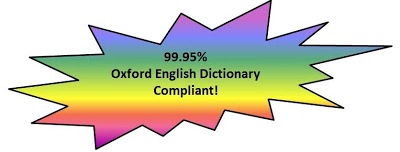LOL, OMG, SRSLY, #WTF
Between text messaging, social media, and dictionaries adding the most absurd “words” it is clear that the English language is changing at a torrid pace. If I’m being honest, I can say that I purposefully avoid anything to do with all this gosh darned newfangled hogwash poppycock. My text messages contain full words only interrupted by the occasional smiley face or ampersand (to convey a specific emotion or provide a more logical grouping of words) and the same goes for my social media posts.
Listen up: I’m a writer. If I can’t say it using Oxford English Dictionary words from before the year 2000 then I am failing miserably at my craft and should feel embarrassment and shame.
Keep in mind that I am also human, which means I am also imperfect. A quick search of my Twitter feed for the two most common non-words that are now words (LOL and OMG) came up with the following:
(The tweet at the top links to this particularly funny cartoon, the second tweet from the top is a conversation between myself and Christine Reid – that makes absolutely no sense to me today, the second from the bottom links to this old blog post of mine with a shout out to Wren Emerson, and the bottom tweet links to an old Hockey News article I dug up in my archives)
I think that’s a pretty damn good track record. Out of more than 7,600 tweets there are exactly 4 that use stupid acronyms (none in the last 18 months when, arguably, I started to get more serious about writing). If you’re into percentages, that’s somewhere around 0.05% I think I’m going to start creating badges to put on blogs and profile pictures:
Like anyone else I have my vices and whether it’s on Twitter or on Facebook I have a habit, an addiction really, to all things hashtag. Hashtags, as they kids are saying, are all the #rage.
For those not so well versed on the nuances of social media here is the definition from our friends over at Wikipedia:
Hashtag
#.[1][2] It is a form of metadata tag. Short messages on microblogging and social networking services such as Twitter, Tout,
identi.ca, Tumblr, Instagram, Flickr, Google+ or Facebook may be tagged by putting “#”
before important words, as in:
#Wikipedia is an #encyclopedia that anyone can edit.
Hashtags provide a means of grouping such messages, since one can search for the hashtag
and get the set of messages that contain it.
Well that clears that up.
It’s probably best to look at a few examples of what the hashtag provides in terms of added value. I took the liberty of doing a hashtag search on the most popular site for hashtags (Twitter) and one of the newest sites to start incorporating the hashtag (Facebook). Naturally the hashtag I chose to use as my search was #hashtag:
If you take even a cursory glance at the results you’ll be able to see that some people are using the hashtag #hashtag in their posts for no other reason than to have a hashtag in their post. I wonder if they think they’re being clever? #lame
So what’s wrong with just searching for any old word? Context. Not that there is a lack of context, but plain text searches tend to give you more of it than you need. The hashtag acts as a consolidator to group similarly contextual posts together so that not every one that contains that word shows up in your results (though Twitter will often return search results from all the other text in the tweet as well. #sigh)
For a while, Facebook refused to get on board the hashtag train. In fact, some people would get downright angry if you happened to drop a hashtag into a status update or comment. When it was introduced a few months ago there was a flood of hashtag use and I have to admit, even this hashtag lover was mildly #annoyed. What’s more, I did a quick check on searches for hashtags of a questionable nature on Twitter and Facebook and the latter is censoring their search results to a much higher degree (not cool, Facebook. Not cool at all.)
That aside, in my tweets and Facebook statuses, and yes even in the occasional text message (this is how you know you have a hashtag problem) I will continue to use, and advocate the use of, hashtags. Right or wrong, for better or worse, it’s the path I have chosen. #YOLO
As far as this post is concerned I just can’t take it any more, so I make this promise to you now: you won’t see any hashtags in future posts or formal writing of mine ever again. Never mind the fact that I won’t feel at all bad if someone catches me breaking my promise. That just means someone is actually reading my stuff, and I’m perfectly okay with that. Cleverness #FTW!
~ Andrew


